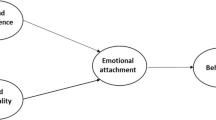Abstract
In a purchase decision process, consumers often tend to choose a branded product that arouses the most positive brand affect. Recent literature identified brand personality as a central driver for brand affect and showed that consumers prefer brands that are aligned with their own personality traits. Hence, harmonization of brand personality with personality traits of the target market segments may lead to affective brand loyalty. However, focusing on consumers’ personality traits for market segmentation is challenging, since personality traits are not directly observable. Linking personality traits to easily observable variables may simplify company’s communication efforts to create brand personality. We therefore explore whether a consumer’s preference for a specific sport may serve as a predictor of the consumer’s response to brand personality and found evidence that different sport clusters differ significantly with respect to certain personality traits.
Access this chapter
Tax calculation will be finalised at checkout
Purchases are for personal use only
Similar content being viewed by others
References
Aaker, J. (1997). Dimensions of brand personality. Journal of Marketing Research, 34(3), 347–356.
Costa, P. T., & McCrae, R. R. (1992). Revised NEO Personality Inventory (NEO-PI-R) and NEO Five-Factor Inventory (NEO-FFI) professional manual. Odessa, FL: Psychological Assessment Ressources.
Geuens, M., Weijters, B., & Wulf, K. D. (2009). A new measure of brand personality. International Journal of Research in Marketing, 26(2), 97–107.
Hartmann, C., Minow, H. J., & Senf, G. (2011). Sport verstehen - Sport erleben. Berlin: Lehmanns.
Lin, L.-Y. (2010). The relationship of consumer personality trait, brand personality and brand loyalty: An empirical study of toys and video games buyers. Journal of Product & Brand Management, 19(1), 4–17.
McCrae, R. R., & John, P. O. (1992). An introduction to the five-factor model and its applications. Journal of Personality, 60, 175–215.
Mulyanegara, R., Tsarenko, Y., & Anderson, A. (2009). The big five and brand personality: Investigating the impact of consumer personality on preferences towards particular brand personality. Journal of Brand Management, 16(4), 234–247.
Saum-Aldehoff, T. (2012). Big Five: Sich selbst und andere erkennen. Ostfildern: Patmos.
Thomas, B. J., & Sekar, P. C. (2008). Measurement and validity of Jennifer Aaker’s brand personality scale for Colgate brand. VIKALPA, 33(3), 49–61.
Wedel, M., & Kamakura, W. (2000). Market Segmentation. Norwell (MA): Kluwer Academic Publishers.
Wright, P. L. (1975). Consumer choice strategies: simplifying vs optimising. Journal of Marketing Research, 12, 60–67.
Author information
Authors and Affiliations
Corresponding author
Editor information
Editors and Affiliations
Rights and permissions
Copyright information
© 2018 Springer International Publishing AG, part of Springer Nature
About this paper
Cite this paper
Paetz, F., Semmler-Ludwig, R. (2018). Consumer’s Sport Preference as a Predictor for His/Her Response to Brand Personality. In: Kliewer, N., Ehmke, J., Borndörfer, R. (eds) Operations Research Proceedings 2017. Operations Research Proceedings. Springer, Cham. https://doi.org/10.1007/978-3-319-89920-6_9
Download citation
DOI: https://doi.org/10.1007/978-3-319-89920-6_9
Published:
Publisher Name: Springer, Cham
Print ISBN: 978-3-319-89919-0
Online ISBN: 978-3-319-89920-6
eBook Packages: Business and ManagementBusiness and Management (R0)




